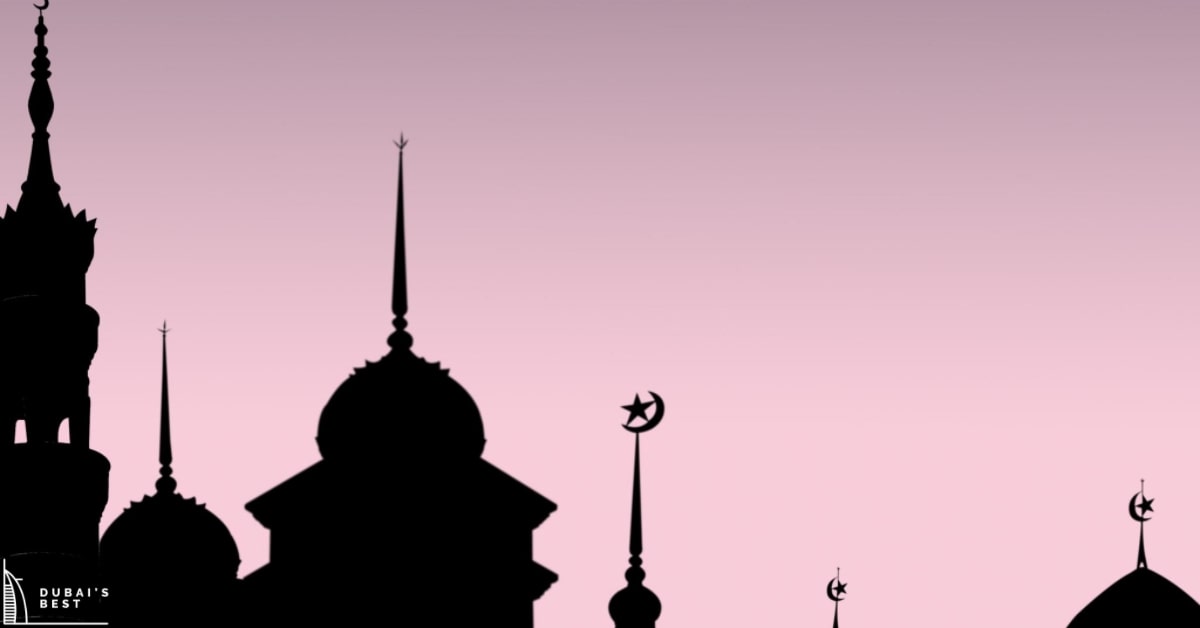What Is Ramadan in Dubai?
If you’ve ever wondered what Ramadan in Dubai is like, from the suhoor and iftar rituals to the city’s festive atmosphere, then you’re in the right place!
Whether you’re a Muslim or not, let’s learn a little bit about Ramadan in Dubai to make your trip to the city unforgettable.
History of Ramadan

Ramadan is the ninth month of the Islamic calendar, when Muslims around the world fast from dawn to dusk and focus on spiritual growth, charity, and community.
Ramadan comes from ar-ramad in Arabic, which means “scorching heat.” It celebrates the first time that God revealed the Quran, Islam’s sacred book, to Prophet Muhammad in a cave near Mecca.
In 624 CE, the very first Ramadan happened in Medina, which is now in Saudi Arabia.
It marked the second year of the Hijrat, which means “migration” or “emigration” in Arabic and refers to the journey of Prophet Muhammad and his followers from Mecca to Medina in 622 CE.
What is Dubai like during Ramadan?

Ramadan in Dubai is marked by cultural and religious events, such as Iftar meals, live shows, and shopping festivals. The city is quieter during the day and more festive at night.
Dubai is a lively and diverse city that invites people worldwide to explore its wonders. But when you visit Dubai during Ramadan, you must be respectful and aware of the local culture and rules.
You don’t have to fast or pray as Muslims do, but you shouldn’t eat, drink, smoke, or chew gum in public when they are fasting from dawn to sunset. They also avoid tobacco, sex, music, and drinking alcoholic drinks. That’s rude and against the law.
You can still have your meals and drinks in hotels, malls, or restaurants open during the day. You should also dress decently and avoid loud music or kissing in public.
Ramadan doesn’t mean Dubai is boring. It’s more fun at night when Muslims break their fast with delicious food and celebrate with their friends and family.
You can join them for iftar, the big meal after sunset, which you can find at unique tents or restaurants that serve Arabic and international food. You can also watch live shows, go to cultural events, see art exhibitions, shop till you drop, and more during the night.
Is it okay to visit Dubai during Ramadan?

Visiting Dubai during Ramadan is allowed. However, strict adherence to local customs and laws, like not eating or drinking in public during fasting hours, is expected. Respectful behavior towards those observing Ramadan is essential.
It’s important to respect their customs, so if you’re not fasting, avoid eating in public during fasting hours, and be understanding and sensitive to those observing Ramadan.
Traditions and Practices During Ramadan
Suhoor
Suhoor is the meal Muslims have before dawn during Ramadan, which marks the beginning of their daily fast. It’s a special time to break the fast from the previous night and come together with family and friends.
Besides enjoying the meal, it’s also a moment for prayer and self-reflection, thinking about the meaning of Ramadan and its importance.
The foods typically eaten during Suhoor include dates, milk, yogurt, oatmeal, eggs, and bread, as they provide essential nutrients and energy to help Muslims stay strong throughout the day while fasting.
Iftar

Iftar is the meal that Muslims eagerly have at sunset during Ramadan to break their daily fast. It’s a remarkable and significant moment, especially after fasting for around 15 to 16 hours in many parts of the world.
Ensuring the Iftar meal is balanced and nutritious is essential to replenishing the body after a long day of fasting.
Dates traditionally come first at the Iftar meal, followed by water and other light fare. After having dates, Muslims offer the Maghrib prayer, which marks the end of their daily fast.
Then, they dig into the main Iftar meal, which can vary but often includes dishes like soup, rice, vegetables, desserts, fruits, and refreshing drinks.
Laylat al-Qadr

Laylat al-Qadr known as the “Night of Power,” was a special night in Islam when God first sent down the Quran, the holy book of Islam, to Prophet Muhammad through the angel Gabriel in a cave near Mecca in the seventh century CE.
Laylat al-Qadr is one of the holiest nights of the year for Muslims because it’s believed to be a night when God showers His mercy and blessings on those who pray to Him.
Laylat al-Qadr does not have a fixed date, but it happens on one of the last ten nights of Ramadan, especially on the odd nights (21st, 23rd, 25th, 27th, or 29th).
Muslims celebrate Laylat al-Qadr by staying up all night in worship, prayer, and supplication.
They also read the Quran, ask for forgiveness from God and others, and do good deeds. Some Muslims go to the mosque and stay there in retreat (i’tikaf). They also look for signs of Laylat al-Qadr, such as peace, tranquility, light, and pleasant dawn.
Laylat al-Qadr is not a public event or party but a personal and spiritual one. It’s not something that tourists or non-Muslims can join or watch unless a Muslim friend or host invites them.
What are things to do in Dubai while visiting during Ramadan?
Visit the mosques

It’s essential to note that non-Muslims may not enter the prayer areas during the designated prayer times.
The good news is that many of these mosques still open their doors to visitors during the day, allowing tourists to appreciate their architectural beauty and learn about Islamic culture.
For instance, the Jumeirah Mosque offers guided tours that cater specifically to non-Muslims, making it a fantastic opportunity to gain insights into this stunning place’s religious and cultural aspects.
Explore Ramadan Tents

Ramadan tents are places where people can have their iftar meal which typically is only for families or neighbors in the Middle East. But now, many restaurants and hotels also set up Ramadan tents.
Visiting one is a great way to socialize with friends and family after a long day of fasting. They offer various sweets, entertainment, and fun until late at night.
Some people or groups host Ramadan tents for free for anyone to have iftar. While not very common, the Ramadan Tent Project (RTP) is one group that does this, having given free iftar to more than 50,000 people in different parts of the world.
Have Iftar at the Dubai Opera
Treat yourself to an Arabic and international cuisine feast in the beautiful Dubai Opera, which becomes a majestic dining hall during Ramadan.
After having your iftar, you can also enjoy live shows of music, dance, and theatre from different genres.
Witness the Ramadan Canons
See the old tradition of shooting cannons at sunset to signal the end of the fast and at dawn to signal the start of the brief. You can watch this show at different places around the city, like Burj Park, Madinat Jumeirah, and Zabeel Park.
Shop Your Heart Out

Don’t miss the Ramadan sales and discounts that many stores and malls have during the holy month. You can get exceptional bargains on clothes, gadgets, jewelry, and more at places like The Dubai Mall, Mall of the Emirates, and City Centre Deira.
You can also shop until you drop, as many malls stay open until midnight or during Ramadan.
What are the do’s and don’ts if you visit Dubai during Ramadan?
During Ramadan in Dubai, there are some important things to remember to respect the local customs and traditions.
Do’s:
- Respect Fasting Hours: Muslims fast from sunrise to sunset, so even if you’re not fasting, it’s considerate to avoid eating, drinking, or smoking in public during the daytime.
- Greet with “Ramadan Kareem”: When meeting locals, a warm “Ramadan Kareem” (meaning “Generous Ramadan”) greeting shows your respect for the holy month.
- Dress Modestly: Modesty is appreciated, especially around mosques and public places. Avoid revealing or skimpy clothing.
- Be Mindful of Behavior: To be respectful, avoid public displays of affection, loud music, or any behavior that might be seen as disrespectful during this vital time.
- Join Iftar: If you receive an invitation to an Iftar meal, it’s a great way to experience traditional cuisine and the spirit of the community during Ramadan.
- Understand Adjusted Business Hours: Some offices may have adjusted hours during Ramadan, with early opening and closing times. Keep this in mind when planning your activities.

